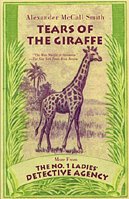Tears of the Giraffe

I did not have high hopes for the second book in the No. 1 Ladies Detective Agency series. Although the first was entertaining and a pleasant read, I wondered how long the series could keep my attention if the strategy was to simply add additional light mysteries for Precious Ramotswe to solve. This installment, though, brought us more into the personal life of Mma Ramotswe, especially with her new fiancee' Mr. J.L.B. Matekoni. We also get to know her secretary turned understudy, Mma Makutsi, an amusing character and graduate of the Botswana Secretarial College.
Alexander McCall Smith, as I stated in the earlier post on the first book, obviously has great first-hand knowledge of this culture. He colors a detailed picture that draws the reader into life of this lady of Botswana. From what I have gathered from his bio and picture, he is a white Westerner. There were times that I would catch myself thinking, "I'm not sure an African would think that". He seems to add a Westerner thought process to his main character in order to teach his audience about African life. I'm just not sure rural, native Africans think about the white experience that much.
Mma Ramotswe found it difficult to imagine what it would be like to have no people. There were, she knew, those who had no others in this life...Many white people were like that, for some unfathomable reason; they did not seem to want to have people and were happy to be just themselves. How lonely they must be--like spacemen deep in space, floating in the darkness, but without even that silver, unfurling cord that linked the the astronauts to their little metal womb of oxygen and warmth...That one criticism, though, is fairly insignificant to the overall experience. Tears of the Giraffe was another pleasant, easy read.
****


1 Comments:
I loved this book, though not quite as much as the first. I was going to write my own review, but you've beaten me to it! =)
One thing this book has made me question are my perceptions of Africans, due to our conversation. While sometimes I do think "an African would not think that way", at other times I am not so sure. The people suprised me in many ways when we went over.
I'm also needing to learn more about Botswana before making that conclusion - Botswana is, no doubt, quite different than Uganda, with which we have experience. The idea of a stable African country like the Botswana described is hard to fathom, at times. There seems to be a real sense of national identity that supercedes clan loyalty, which is not the case elsewhere. He writes about Botswana with a lot of love and hard-won insight. I wonder if the Botswana described is more fiction, reality, or a bit of both.
One thing, above all, that I cherish about this series is that it humanizes Africans in an honest, non-condescending way. They have hopes and dreams, flaws and strengths, know love and pain - just like any of us. Through the characters, and the voice of Mma Ramotswe (who acts as an archetype, a voice of Africa), the make the case that Africa should solve its own problems, in its own ways, and in its own time.
Post a Comment
<< Home